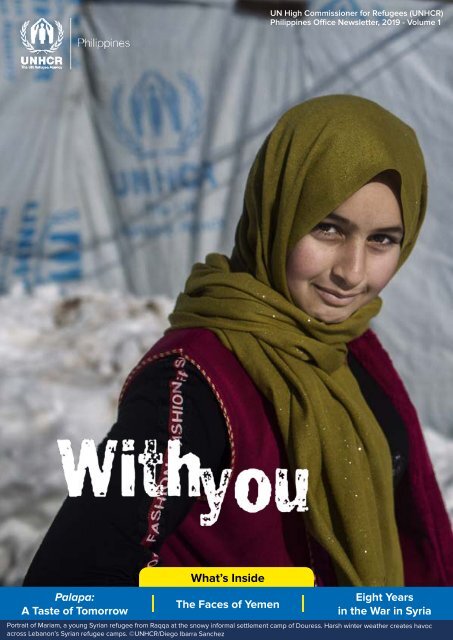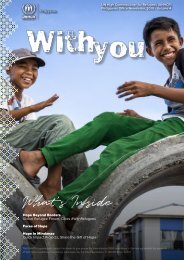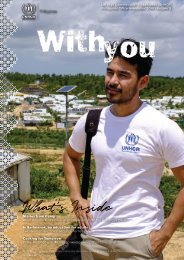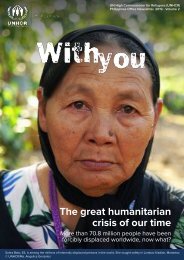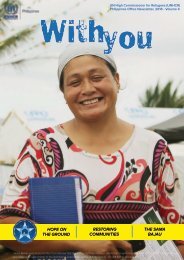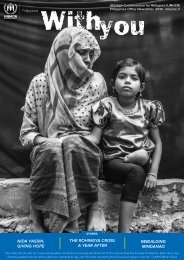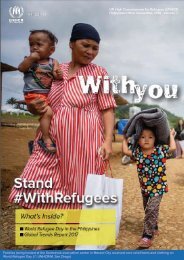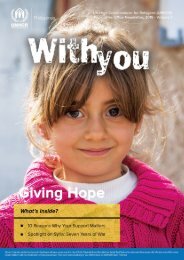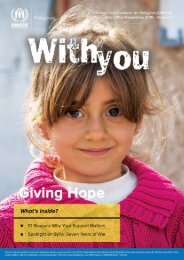With You, 2019 - Volume 1
You also want an ePaper? Increase the reach of your titles
YUMPU automatically turns print PDFs into web optimized ePapers that Google loves.
UN High Commissioner for Refugees (UNHCR)<br />
Philippines Office Newsletter, <strong>2019</strong> - <strong>Volume</strong> 1<br />
Palapa:<br />
A Taste of Tomorrow<br />
What’s Inside<br />
The Faces of Yemen<br />
Eight Years<br />
in the War in Syria<br />
Portrait of Mariam, a young Syrian refugee from Raqqa at the snowy informal settlement camp of Douress. Harsh winter weather creates havoc<br />
across Lebanon’s Syrian refugee camps. ©UNHCR/Diego Ibarra Sanchez
Message from the Representative<br />
Special Feature<br />
Message from the<br />
Representative<br />
Dear donor,<br />
Warmest greetings!<br />
For the past years, I look at March with some<br />
sadness and hope. This year is no different. This<br />
<strong>2019</strong>, we mark several heart-breaking milestones –<br />
the Eight Year War in Syria, the 4th year of conflict<br />
in Yemen, and the anniversary of the earthquake in<br />
Japan. These tragic events have displaced millions<br />
of families from their homes. After some years,<br />
some were able to go back home and rebuild their<br />
lives in safety and in dignity.<br />
Forcibly displaced families are just like us. This<br />
truth was repeated to me when I was stationed<br />
in Bangladesh where I had the honor of working<br />
with a Syrian colleague. Like many Syrians, his<br />
wife and children were displaced by the tragic war.<br />
“They miss home terribly,” he told me. His wife and<br />
children weighed the risks and returned to a<br />
war-torn Damascus, because it was the only home<br />
that they had ever known. “I don’t know what to do,”<br />
he told me one day.<br />
It was at that moment that my commitment to<br />
supporting the forcibly displaced families was<br />
“[...] but together,<br />
we also look at the<br />
future with hope.”<br />
reinforced. Every single displaced person is<br />
someone’s mother, father, and child. The millions of<br />
people who are struggling everyday – the 13.1 million<br />
people driven away from their homes by the war<br />
in Syria, the 24 million in dire need of assistance in<br />
Yemen – are all women, men, and children, who had<br />
a family, a job, a home.<br />
These forcibly displaced families have been<br />
struggling for years just to survive. Yet, you have<br />
continued to support them in their greatest time of<br />
need.<br />
As part of our community of givers, you continuously<br />
make the commitment to take a step with them.<br />
In this issue of <strong>With</strong><strong>You</strong>, we share with you some<br />
poignant stories from Philippines, Yemen, and Syria.<br />
Indeed, we look at March with some sadness<br />
because of the tragic events, but together, we also<br />
look at the future with hope. We can continue to<br />
make a difference in the lives of families forcibly<br />
displaced from their homes.<br />
Sincerely,<br />
Shinji Kubo<br />
Representative<br />
UNHCR Philippines<br />
A Taste of Tomorrow<br />
Food is a way to nourish one’s self. A staple food offers<br />
a different meaning for the forcibly displaced women in<br />
a transitional shelter in Lanao del Sur.<br />
The palapa is a common side dish in Maranao cuisine.<br />
It is made out of ginger, coconut, onions, garlic, salt, and<br />
sakurab (a kind of shallot that only grows in cold areas).<br />
It is also a dish that unites the most vulnerable women<br />
and preserves the Maranao heritage. This dish is often<br />
used in Maranao cuisine to give viands a spicy kick. No<br />
household or eatery in Lanao Del Sur is seen without it.<br />
More than a side<br />
UNHCR Philippines helped turned this side dish into<br />
a hero for some internally displaced families. Through<br />
a quick-impact project, UNHCR was able to set-up<br />
Palapalicious, a livelihood project that trains and assists<br />
displaced women in the business of selling palapa.<br />
Founded in 2018, Palapalicious was a way for the<br />
internally displaced women to learn new skills, earn<br />
a living, and take a step to rebuilding their lives in<br />
safety and in dignity. It was also an avenue for the<br />
most vulnerable women having shared experiences of<br />
displacement form a safe community.<br />
“Kaming mga IDPs- mixed kami diyan, marami sa<br />
barangay shelter. Halo-halo kami. Nung magkakasama<br />
kami, masaya. Nagkakasayahan. Kung baga<br />
nagkaroon kami ng good friendship. Magandang<br />
samahan.” said Sania Naga, a internally displaced<br />
person and member of Palapalicious.<br />
It is because of continued commitment from donors<br />
and supporters that hope is restored to the women who<br />
have lost everything because of conflict. Through this<br />
quick-impact project, the displaced women were able<br />
to start a community among themselves and take a step<br />
towards building better futures.<br />
©UNHCR/ Ma. Angelica Gonzalez<br />
2 <strong>With</strong> <strong>You</strong> | Vol. 1, <strong>2019</strong> <strong>With</strong> <strong>You</strong> | Vol. 1, <strong>2019</strong> 3
Special Feature<br />
Special Feature<br />
THE FACES<br />
OF YEMEN<br />
The crisis in Yemen is entering its fourth year and more than 24<br />
million people in Yemen are in dire need of assistance. Each one<br />
of the statistics is a story of despair and survival. As we mark this<br />
heart-breaking milestone, we take a look at some Yemenis who are<br />
doing all that they can to survive and rebuild their lives in the midst<br />
of the terrible conflict.<br />
“We did not come to Korea for money or for better jobs. We<br />
came because Korea is a safe country. We cannot return<br />
now or even in the near future. If we return, we will die.”<br />
Thousands of families have fled from their homes because of the<br />
conflict in Yemen. One of them is Sami Al-baadani, who ended up in<br />
Jeju Island in South Korea. When Sami arrived, he did not receive a<br />
warm welcome in the small island. Yet, he found a friend in Ha Min<br />
Kuyang, a South Korean refugee advocate.<br />
Najiba,<br />
Yemeni Mother of Two<br />
“I ask Allah (God) to heal me and every patient from<br />
this disease. But my disease and the disease of others<br />
is not important. What’s important is the cancer (of<br />
war) in this country to vanish…why should I care about<br />
my cancer if the whole country has cancer?”<br />
Najiba is a mother of two and used to live in the quiet village of Taizz. This<br />
was until fighting broke out in her hometown that forced her to escape to<br />
Sana’a. She was unable to find a safe place there and was left homeless.<br />
Forcibly displaced persons, like Najiba, are more vulnerable to physical<br />
and mental health problems and human trafficking.<br />
Through the support of donors like you, UNHCR was able to provide<br />
shelter assistance to thousands of IDPs, desperately in need of a home.<br />
Ha Min opened the first Yemeni restaurant in Jeju Island, helped<br />
provide jobs for Yemenis who lost everything, and advocated for<br />
cultural exchange. Through these initiatives, the locals are able to<br />
look beyond cultural differences.<br />
Sami still misses his home, but through the support of Ha Min and<br />
other locals, he is now able to find a safe place and<br />
rebuild his life in safety and in dignity.<br />
Salwa,<br />
Yemeni Mother of Six<br />
Sami,<br />
Waiter at Wardah Restaurant<br />
“I stepped outside to get some food and then they were hit by<br />
a plane. When I went back to the house there was no one –<br />
my children, my brothers, mother, nor husband… I fear for my<br />
remaining children…I feel sorry to see them without food.”<br />
In <strong>2019</strong>, an estimated 3.3 million people are internally displaced in<br />
Yemen. Salwa is one of them. She still remembers how her house blew<br />
up and she barely escaped with her life. She was forced to flee to the<br />
outskirts of Sana’a, the largest city in Yemen. Every day, Salwa struggles<br />
to survive as food and water are extremely limited.<br />
Internally displaced people like Salwa are often in need of basic<br />
necessities - food, water, and clothing. They are also susceptible to<br />
vulnerabilities and are in need of continued protection assistance.<br />
“We didn’t know what it was but we thought we could<br />
play with it. A minute or so after she picked it up, it<br />
exploded. When I woke up, I was in the hospital.”<br />
In 2017, Salah and his friend Kareema were herding sheep in a field<br />
near their home when they found an unusual object. It exploded and<br />
immediately killed Kareema and amputated Salah. Later in that year,<br />
Salah with his sister and grandmother, were forced to flee their home<br />
due to the conflict. His parents were left behind because they did not<br />
want to leave their house and livestock.<br />
Salah now lives in a makeshift shelter with his sister and<br />
grandmother. They own nothing save for the clothes on their backs<br />
and core-relief items that were delivered by UNHCR. Salah is one of<br />
the millions of children who have been robbed of their childhood.<br />
Salah,<br />
Child from Yemen<br />
“I wrote my children a will in case I didn’t make it.<br />
I told them to learn and study hard.”<br />
Ali was a family man and shopkeeper in Yemen. This all changed when<br />
conflict broke out near their home. Ali and his wife contemplated fleeing via a<br />
small raft with their children, but they were weary of the waves.<br />
Rather than risk the lives of their children at sea, Ali and his wife made the<br />
painful decision to leave their children behind. They left their children in the<br />
mountains safe from shelling and war, while he and his wife took a small boat<br />
to Italy where they almost lost their lives at sea.<br />
He has not seen his children since then.<br />
Ali is one of many who crossed continents and faced the most perilous<br />
conditions in search of safety. Ali and thousands of refugees across the<br />
globe are dreaming of the day that they are reunited with their families.<br />
Ali,<br />
Yemeni refugee to Italy<br />
Families experience the crisis in Yemen in a multitude of ways, but they all know the struggle for survival. They are often<br />
left with nothing. But with your continued support, we can provide them with safety and protection in their darkest hours.<br />
Through the generosity of donors like you, we are able to help Ali, Salwa, Najiba, and Salah. Together, we can help them<br />
rebuild their lives in safety and in dignity.<br />
©UNHCR/ N. George, H. Hariri, B. Ahmed, S. Mantoo, UNHCR Yemen<br />
4 <strong>With</strong> <strong>You</strong> | Vol. 1, <strong>2019</strong><br />
<strong>With</strong> <strong>You</strong> | Vol. 1, <strong>2019</strong><br />
5
Special Feature<br />
Special Feature<br />
Eight Years in<br />
the War in Syria<br />
of their humanity, and the improvement of the quality<br />
of their lives. Together we work in the pursuit of<br />
rebuilding the lives of the forcibly displaced in safety<br />
and in dignity.<br />
<strong>You</strong>r donations have helped us build support for the<br />
refugees. <strong>You</strong> have provided direct assistance, shelter,<br />
relief items, and continued protection. Together,<br />
we can continue to stand with them in their time of<br />
greatest need.<br />
“There were airstrikes and<br />
dead bodies around us… I<br />
didn’t want my kids to end<br />
up like that.”<br />
- Zeenab, Syrian Refugee in Jordan<br />
When her house was destroyed in conflict, Zeenab<br />
immediately left Syria with her two sons. They walked<br />
through the winter cold to reach Jordan. They were<br />
received by UNHCR staff. and given shelter and life<br />
saving support.<br />
Zeenab is one of the millions of Syrians who struggled<br />
to make it out of the war zone. After eight years, 5.6<br />
million refugees continue to fight for survival and rely<br />
on humanitarian aid.<br />
On March 2011, conflict broke out in Syria after 16<br />
students were penalized for activism against the<br />
government. The conflict quickly escalated as a myriad<br />
of other forces and groups became involved. The<br />
layered war resulted in a broken city, with uncountable<br />
casualties and people fleeing from their homes.<br />
And the distress did not end there.<br />
To this day, the war continues. Civil unrest and<br />
extremism has long penetrated the area. To this day,<br />
the Syrian people live in constant fear of violence. An<br />
end to the sufferings of the Syrian families is not within<br />
sight.<br />
People like Zeenab have left everything behind. For<br />
eight long years, they have been struggling to survive.<br />
UNHCR works for the protection of refugees in three<br />
strategic stages: responding with life saving support,<br />
safeguarding rights, and building better futures. This<br />
response covers their physical survival, the restoration<br />
6 <strong>With</strong> <strong>You</strong> | Vol. 1, <strong>2019</strong><br />
©UNHCR/ Antwan Chnkdji<br />
©UNHCR/A. Chnkdji<br />
SOURCE: BRP2018-<strong>2019</strong> |<br />
REGIONAL REFUGEE RESILIENCE PLAN<br />
QUARTERLY UPDATE ACHIEVEMENTS DECEMBER 2018<br />
<strong>With</strong> <strong>You</strong> | Vol. 1, <strong>2019</strong> 7
Help save the lives<br />
of Yemeni families.<br />
donate.unhcr.ph<br />
UNHCR Philippines<br />
6F, GC Corporate Plaza<br />
150 Legaspi Street, Legaspi Village<br />
Makati City<br />
403-2256<br />
UNHCRPhilippines<br />
UNHCRph<br />
unhcrph<br />
phimapsfr@unhcr.org<br />
unhcr.org/ph<br />
© UNHCR/A. Chnkdji


